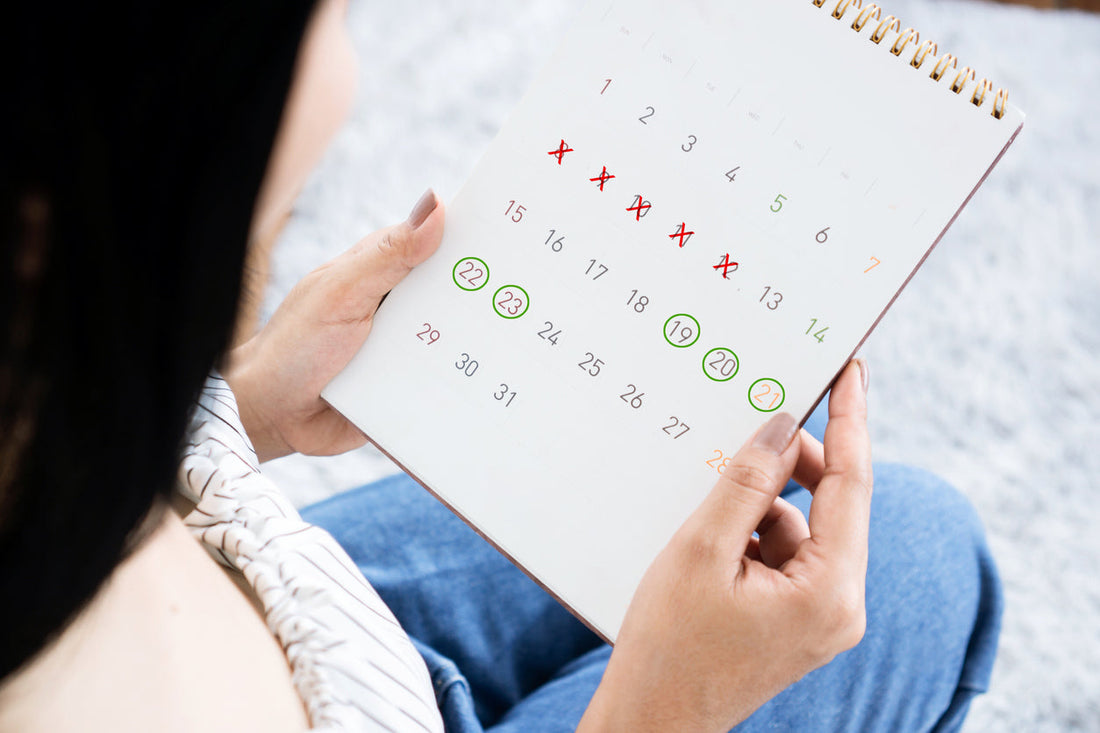
Understanding Your Hormonal Cycle and Acne
Share
Hormonal acne is something that many people with uteruses deal with, often arriving as an uninvited guest in the middle of the month along with the monthly cycle. This blog is going to explain why this happens, and how hormonal changes throughout the month contribute to those annoying breakouts.
The Hormonal Rollercoaster
Women (and other bleeding people) go on a hormonal rollercoaster every month and that can affect their skin a lot. The main actors in this drama are estrogen, progesterone and androgens (like testosterone). These hormones fluctuate during the menstrual cycle and also affect oil production in the skin, and therefore acne.
- Menstrual Phase (Days 1–5): When your period starts, both estrogen and progesterone are at a low level. That can result in increased oil production, which can make the skin more susceptible to breakouts.
- Follicular Phase (Days 6-14): During this phase, estrogen levels begin to rise, which can help balance oil production and lower the risk of acne. This is usually the skin’s “happy phase”—it simply looks the best!
- Ovulatory Phase (Days 14-16): Estrogen and testosterone peak, which can stimulate oil production. This is when some people may begin to notice a few extra blemishes cropping up.
- Luteal Phase (Days 17-28): Preparing for menstruation, progesterone levels rise again, triggering oil glands and increasing the likelihood of breakouts. This stage is infamous for its contribution to premenstrual acne that might appear as painful cysts along the jawline and cheeks.
Why Do Hormones Cause Acne?
When combined with dead skin cells and bacteria, excessive sebum can clog pores and cause acne, while hormonal changes can also make your body produce more sebum. During this stage, increased levels of androgens can promote an overactivity of the sebaceous glands that produce sebum, especially during the luteal phase.
The Acne Spectrum
There are different types of hormonal acne, which include:
- Comedones: These are your classic whiteheads and blackheads.
- Papules: Raised red bumps that are small and sore to the touch.
- Pustules: These are papules filled with pus, the angry- and inflamed-looking pimples.
- Cysts: Deep, painful lumps within skin that can take longer to heal.
Hormonal Acne: How To Manage It (Tips & Tricks)
Although you cannot fully control your hormonal fluctuations, there are a number of ways that you can help manage hormonal acne:
- Diet Matters: Consume high-fiber foods and low-glycemic foods that can help regulate your hormone levels. Fruits, nuts, and whole grains are your allies!
- Stress Management: Stress can aggravate hormonal fluctuations, thus, practices such as yoga, meditating, or even laughing a lot may help you maintain clear skin.
- See a Dermatologist: For persistent hormonal acne, talk to your dermatologist about treatment options including hormonal treatments or medications.
- Skincare Routine: Use non-comedogenic products that are suitable for oily skin. Add retinol or bakuchiol to your regimen to clear away dead skin cells. Though, please keep in mind that retinol is not suitable for pregnant folks.
Recommended Skincare Products for Acne-Prone Skins
VIVIDRAW's Niacin Onion All Clear Ampoule is non-comedogenic and is specifically designed for acne-prone skin types. Paired with Swiss microbiome water, this powerful niacinamide ampoule really helps even out bumpy skin texture and restore healthy skin barrier.
If you want to tackle a more fundamental imbalance in your skin barrier, this Sebum Rebalancing Rx 131 Ampoule from Celladix is what we strongly recommend. This product restores healthy skin barrier with skin-identical moisturizing ingredients such as squalane, beta-glucan, and phytosterol, and effectively melts away blackheads and whiteheads.
Conclusion: Embrace the Cycle
Knowing how our hormones influence our skin leads to empowerment as people with uteruses take back their skin health. Though hormonal acne can be infuriating, identifying the patterns can aid in controlling breakouts with success. So the next time a pimple crops up, keep this in mind: Your hormones are simply having their monthly dance party! So, just surrender to the cycles, and remember to love yourself a little extra on the hard days. Because everyone deserves to feel beautiful in their skin, regardless of those hormonal swings!












